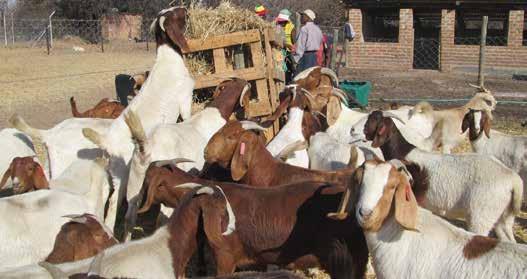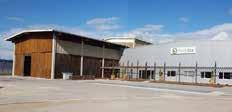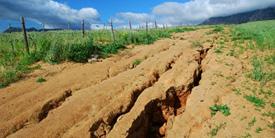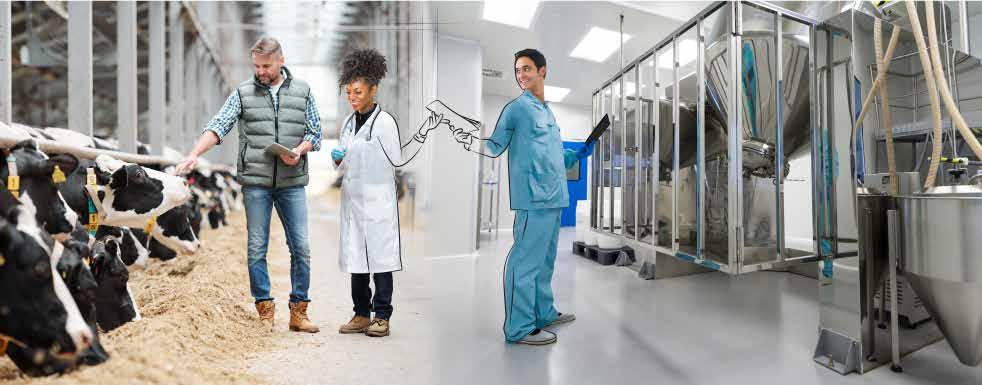
7 minute read
Goat farming in Zimbabwe
An increasing number of farmers are keeping goats for commercial purposes in Zimbabwe. Goat farming business is a very profitable business to operate in Zimbabwe. The demand for goat meat is increasing. People want to try a different type of meat which is not chicken, beef or pork. Goats are easy to keep and are very profitable as the feed costs are low due to the fact that they eat a variety of foods. An increasing number of farmers in Zimbabwe are keeping goats due to the high profits from the goat farming business. Demand for goat meat is high and there is a lot of potential for the growth of the market.
So much so that Mnangagwa, while commissioning the Bindura University of Science Education (BUSE) Goat Genetics and Artificial Insemination Centre, said that “Goat breeding projects and attendant value addition interventions will go a long way towards ensuring broad-based empowerment, wealth creation and lifting millions out of poverty within our society.” He further suggested that these project must be deployed towards the realisation of robust and vibrant rural industry systems supported by livestock production and related development of modern animal handling facilities.
Advertisement
The Goat Genetics and Artificial Insemination Centre is a welcome development that serves to get a grip on genetics as a key ingredient in sustainable and successful goat farming.
Zimbabwean breeds have not been subjected to adequate scientific scrutiny. However, a lot of work still has to be done to unlock the potential and promise of goat farming that can uplift millions of our people from poverty. Furthermore, and with a national goat herd of approximately four million, Zimbabwe is barely on the map of goat-producing countries.
The goat herders are favored by the existence of abundant land and suitable climatic conditions that can be leveraged to boost their national herd to 25m by year 2025, should the current situation turn for the better.
According to media reports, most farmers have a long-enduring love and hate relationship with goats. They are seen as troublesome animals that are guaranteed to bring problems including invading into neighbours’ fields. Very little attention is given to goats which explains the 65% pre-weaning mortality rate. Goats also tend to live in unbearable conditions that compromise their health with pneumonia being a leading killer.

In addition, the market also poses a challenge as middlemen and the farmers only regard goats as an object for transaction. Farmers seem to only care for their goats when they exchange them for money. No one is concerned about fixing the gaps in the supply chain that will enable bringing goats to the market in a fairer and transparent manner.
At the same time, none of these players have ventured further to unlock the full value and multiple functions of a goat.
Breeding
There is also currently an ongoing frenzy about mixing local goat breed with foreign breeds such as Boer, Red Kalahari, and Savannah, among others. While there is no fundamental problem with cross breeding, the matter is presented like a quick fix. However, it does not address the core of why the local Mashona and Matabele breeds have progressively grown smaller due to inbreeding. Despite their high profligacy and adaptability, high reproductive wastage under traditional systems of management remains a limitation to increased local goat productivity. This loss in production has been attributed to a number of constraints namely poor nutrition, poor health care and low management input.
Without taking care of the basics, farmers can import all loads of exotic breeds to no avail. There is also a danger that we will end up wiping out our hardier, tastier and adaptable local breeds at the altar of increasing carcass weight through cross breeding.
FOR AFRICAN AGRICULTURE THAT IS NATURALLY FERTILE !
In the future, agricultural production should be intensified sustainably and with respect for the environment.
Who are FCA Fertilisants and Fertilux ?

Proven by the results of official experiments, the performances of FCA Fertilisants and Fertilux solutions provide an answer in the African context.
SUMMARY :
All the continents, and especially Africa, should take on a challenge for the future :

To feed more and more populations under increasingly difficult soil and climatic conditions.
Despite significant progress, productivity in the African continent is still below the other regions in the world and remains a primary concern. At present, one person in four on the continent still suffers from chronic malnutrition. The situation will get worse over the next decades, considering that demographic growth in Africa, forecast at 1.3 billion additional inhabitants by 2050, will further increase the challenge to the African food system.
This is compounded by intensifying climatic changes which will put crops and animal rearing in peril and heighten food safety issues. Without adaptation strategies, the production of corn, which is a basic food in Africa, could fall by 40% between now and 2050. Although the extension of cultivated land has considerably increased agricultural production in the past, it has been to the detriment of the environment. Located in the middle of Europe, the geographic position of their production sites gives FCA Fertilisants and Fertilux direct access to natural raw materials for the agro-industry and microbiology.

Through their patented know-how in soil life biostimulation technologies, FCA Fertilisants and Fertilux enable farmers to take the initiative towards a naturally fertile agriculture by following four principles :
Enriching soil fertility Significantly reducing the carbon effect in comparison to standard fertilisers Increasing the effectiveness of inputs Decreasing the environmental impact
What are the solutions ?
The solutions for eco-friendly fertilisation provided by FCA Fertilisants and Fertilux stabilise the soil by including nutrients and nourishing the microorganisms that are naturally present.
Through a symbiotic relationship with plants, these microorganisms shape plant health in two ways :
By helping to fight off diseases or pests By reinforcing the resistance to biotic and abiotic stress
Eco-friendly fertilisation has several advantages :
> An increase in yield
> Sustainable strengthening of soil and plant health
> Perpetuation of the biological, physical and chemical fertility of the soil
FCA Fertilisants and Fertilux are dedicated to the preservation of relations with farmers and devotedly carry out tests each year directly on "pilot" farms in order to continuously evaluate the pertinence of their solutions and optimise their recommendations and fertilisation programmes.
We invite you to follow the results of these tests and partnerships in the next issues of Farmers Review of Africa...
To contact us : Mr. Sébastien DAVID
sebastien.david@group-shfc.com +33.6.51.17.54.62
Mr. Christophe MONNOT
christophe.monnot@fertilux.lu +33.6.74.23.68.27
SA’s New Dairy Powerhouse

Dairy Group is a new agri-business that combines the Dairy Farmers of South Africa’s (DFSA’s) 120 years’ experience as a market leader in the procurement of raw milk (and the raw milk supplier of premium brands such as Clover) with Coega Dairy’s lowcost efficiency and house-brand knowledge. The result is a powerhouse dairy brand with the potential to significantly strengthen the local dairy sector.
‘Fewer and fewer dairy farmers are able to go at it alone, and collective action is often the key to long-term viability,’ explains Drikus Lubbe, Dairy Group’s CEO. ‘The creation of Dairy Group means the industry as a whole has a better, clearer future growth path, which is crucial for all stakeholders.’
Local dairy businesses compete against sophisticated international players within a volatile local economy. To stay competitive, dairy brands have to achieve better efficiencies and economies of scale, with capital-intensive process technologies key to transforming high volumes into better margins and sustainable business.
DFSA and Coega Dairy’s combined infrastructure and experience rise to these challenges, creating a highly efficient,
Drikus Lubbe, CEO of the newly founded Dairy Group

optimised value chain for members’ raw milk produce.
‘The new formation immediately positions Dairy Group as the leading Ultra High Temperature (UHT) milk supplier to consumers in South Africa,’ says Lubbe. ‘It also has the ability to expand its footprint into Africa by facilitating mergers and acquisitions in competitive dairy categories across its infrastructure network.’ Dairy Group’s ability to expand into Africa - which features 500 million consumers with low exposure to South African dairy brands - is an important part of the logic behind its creation. Success in African markets will, in turn, strengthen the dairy value chain within South Africa. New business opportunities will be created for hard pressed South African dairy farmers, including emerging black-owned farmers, who are central to Dairy Group’s future growth plans.
‘We take a broad view of sustainability, which we see as being as much about achieving viable business growth as maintaining excellent environmental standards,’ says Lubbe. ‘In South Africa, commercial growth has to include a strong focus on black empowerment. This is especially true in the agri-sector, where we need to bring new players in to augment the strength of established entities. Consequently, nurturing new entrants is a central part of Dairy Group’s growth strategy.
We’re looking forward to taking advantage of our new scale and structure to bring that vision to life.’











